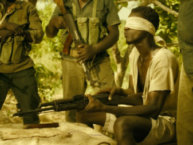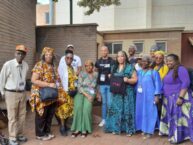It’s my first time in Kampala; this city that’s as cacophonous as a hen yard. Traders selling their merchandise by the roadside seem to be in a contest to see who can sing in the loudest tone as they try to arrest the attention of passers-by. Several young men stand in circles, watching and cheering on a fellow who’s inside the circle, dancing to Lingala music from a huge cassette player. From a distance, hallelujahs and songs of praise and worship can be heard; I don’t know whose church it is. The incessant blaring of car horns. People stream past, some running while others are barely walking, their eyes glued to the phones in their hands. A man who appears to be in a hurry crashes into a plump woman who shouts what must be curse words at him in a language I’ve never heard. The people rushing past speak various languages. You can’t even decipher a word in some.
I would be lying if I said that I’ve been in this city before. All I had in my mind before arrival were street pictures in our Primary Four social studies textbooks, given to us by the teachers. The school had received a batch of up-to-date textbooks from well-wishers and development partners in America. Due to limited space, some of the old books had to be disposed of.
To me, Kampala had remained abstract. That place very far away from home where every villager believed life existed in its absolute form. Everyone believed there was no suffering in Kampala, only doing jobs that didn’t make one dirty as did farming. Nobody believed that there were mosquitoes in Kampala or that the people there actually suffered from Malaria. Talk of good roads that never turn into ponds after a heavy downpour. All Kampala people lived happily and watched TVs, which were rare in villages. Well, everyone that had been there before had interesting stories of how sweet city life was.
However, none of the praises sung by such people has pushed me to Kampala. I’m a refugee, fleeing from the hard expectations of my parents, the eyes and mouths of gossipers. I’m a high school graduate who, for one reason or another, didn’t make it to the University Government Sponsorship List. My parents lack the wherewithal to pay my tuition fees at university where they’d hoped I would study Medicine on Government Sponsorship and take on the baton of catering for my younger siblings’ education. Even though their mouths do not rebuke me for disappointing them, their eyes do. And yes, this hurts. After the results came, words disappeared. And even as I informed them of my decision to leave for Kampala, neither seemed enthusiastic about it. But neither objected to it, anyway.
Mama, however, nodded in agreement when I explained to her in the morning that it was for the good of everyone of us. First of all, I would save enough money to pay my tuition and study Medicine as they’d hoped. And with my salary as a doctor, I would then pay school fees for all my younger siblings. Secondly, going to Kampala meant disappearing from the eyes of village rumour-mongers whose tongues were wagging ceaselessly about how a boy they had thought would become a professor due to his intelligence was in the village rotting like theirs that dropped out of school years ago owing to their snail pace learning. Mama didn’t allow me to give her more advantages of my going to Kampala.
“I trust you”, she said in a low tone. There was a distant look in her eyes. I suppose she was worried about the possibility of things going wrong somewhere. She knows a number of young men who have lost themselves in Kampala life. She hated imagining that I could end up like them.
Kaisho, my childhood playmate, has come to pick me from the bus terminal. He’s been living in the city for close to four years, counting from the time of his flight from the village. The Police were hunting for him for impregnating Mr Bebwa’s daughter, a juvenile. That was around the time I was in my second year in high school. Kaisho, who was two years my senior, had dropped out of school upon completing Primary Seven, the highest class in primary school and was working as an apprentice at a garage in the nearby trading centre. Kaisho is not his real name. He got it following an incident where we had gone to collect firewood in a forest in the vicinity and we decided to make a stop in one rich man’s farm to steal guavas.
Kaisho, who was Kevin then, had climbed the tree leaving my brother Shaka and I down to gather the fruit. Midway into the theft, one of the rich man’s menials spotted us and came running, whip in hand, vowing to give us a thrashing to remember. He was shouting out the old adage. A stealing dog pays with its back. Amidst insurmountable panic, Shaka and I picked as many guavas as we could, in no time turning our shirts into pouches, and we took to our heels. The man was closing in. Kevin knew that he had to run but seeing that he had no time to come down normally, he jumped. Then suddenly, like a pig whose throat has been cut, he produced a prolonged squeal of agony. In the comfort of the distance that we had established between ourselves and the chaser, we stopped and turned to see what the matter was.
“My eye!” Kevin was crying. He was not perturbed by the prospect of the thrashing to remember though the chaser was only a few metres away. The chaser, seeing that Kevin was not running or had surrendered, stopped running and walked over to him. The man put his hands on his head and opened his mouth in shock. He stared at Kaisho without a word. We thought he was still contemplating what to use to give him the thrashing to remember.
“Come and see how your friend has lost his eye. I tell you, stealing is bad. Our forefathers knew what they were saying when they said that a stealing dog pays with its back. See how he’s one-eyed like Nyantagambirwa who ate his eye out of hunger at a function he had gone to attend in heaven!” the man called out to us.
We dropped our guavas and ran back to see for ourselves. Where had Kevin’s eye gone? When we arrived, blood was oozing out of his left eye. He could not open it. Blood! I feared blood and this mere sight of it made me think that Kevin was going to die. Well, his eye had been scratched by a dry twig as he jumped from the tree. I thought that this was what they called jumping from the frying pan into real fire. The man led Kevin to the well where he washed the affected eye, paying no attention to his persistent yelps, but focused on removing the flecks of the twig that had got embedded inside the eyelids. Since then, Kevin’s eye has never opened fully. Just a narrow white slit. To his adversaries at school where he was a dreaded bully, it was a huge blessing. They thought they had got a name that would tame him every time he chose to turn wild. A name that would inflict pain on his soul and force him to think twice before he hurled insults at them or clenched his fingers into fists to pummel them with. They nicknamed him Kaisho -that one-eyed icon. And to everyone’s amusement, the name spread and soon, Kevin was forgotten.
This incident moulded Kevin into a different kind of boy. It wrought in him traits that nobody could’ve thought would truly be part of him at any one time. He avoided engaging in verbal wars with anyone. His enormous size became less advantageous to him as he slowly dumped his love for fighting. Forget Kevin, the ultimate extrovert; Kaisho was a low-keyed boy. The stigma he was subjected to couldn’t have allowed him to remain the same.
There’s one thing that still puzzles me to this day; the possibility of the boy I had known as awfully shy before girls impregnating a 14 year old daughter of a rich man. What words had he used to lure her into the act? Such children are usually full of themselves and exceedingly picky. Four years have passed yet I haven’t come close to believing that Mr Bebwa’s grandson is a product of Kaisho’s water. We haven’t seen each other for all this long but fate is reuniting us. And among the things I’ll demand him to tell me first is this story, which I would herald him for if the girl wasn’t underage.
“Welcome to Kampala”, he says as he shakes my hand with vigour. He lifts my baggage and puts it on his shoulder. I follow him as he forces his way through the crowd. I think he’s caught me staring at a building that’s shockingly tall, for he says, “You see, Kampala is not buildings”. I, of course, don’t understand what he means with the weariness of having to sit for close to six hours in the bus making my head seem too heavy. I feel too lazy to ask, hoping that he’ll go on and explain. He doesn’t .
We’re out of the crowd, standing at a food kiosk. Kaisho orders matooke, fried rice and beef for me and kicommando for himself. I don’t know what ‘Kicommando’ is but I let that slide because I don’t want to be seen as a naive villager. When the food is finally brought, I learn that Kicommando is a meal of flat pancake (chapati) cut into pieces, in bean sauce. I’ve never eaten it but I suppose it’s savoury judging from the way Kaisho licks his lips after every intake. I eat drowsily until Kaisho asks me to double my speed. He’s finished eating and has paid for the food. Now he stands waiting for me to finish too. In the haste to finish my food which I can’t leave on the plate, I pull meat off the bone using my teeth with sprightliness. A woman, who has just sat facing me beside her man as they await the food they’ve ordered, cries. A drop of soup from my piece of meat has entered her eye. Jesus, Kampala women can pretend! Did that hurt?
“Sorry baby”, her man says wrapping his hand round her neck. It’s my first time seeing a twenty-five year-old baby. Kampala is going to be fun to live in!
“”Pardon him, ma,” Kaisho implores the baby who hasn’t stopped crying. I don’t know what I should be pardoned for.
Their food has arrived. There’s fish; I don’t like the foul smell of fish. If I stay a little bit longer, I might regurgitate on the table and give Kaisho more pain of pleading for my condonation, this time round for a clear reason. I push my plate aside, rise, cast two glances at the food I’m leaving on the plate and nod an okay to Kaisho.
“In Kampala, you have to tread with care. Some actions are traps, so the word ‘sorry’ should be written on your lips at all times. Traps. For instance, when that woman cried, it could have been a setup to…” Kaisho pauses his lecture and points at a man who’s just flashed by holding a handbag. A weighty woman is wiggling in the sand not far from where we’re standing.
“My identity card, my ATM card, my God! Thief!” she cries out. Nobody seems bothered. I’m astounded. In the village, a sizeable crowd would now be giving chase with sticks, stones and everything capable of inflicting pain on the human body.
“What’s going on?” I ask Kaisho.
“She’s been robbed,” he replies. “As I told you, Kampala is not buildings.”
“Why is nobody pursuing the thief?”
“Who cares? Nothing is new here. Besides, such people normally move with daggers, hammers and all manner of weapons, including pistols. You follow him, he leads you into a dark place or their den and he hacks you to death. Learn not to care as long as we are in Kampala”. He waits for his words to sink into my head before resuming. “Even when you see two people fighting, assume that it’s a movie scene and you can’t separate the stars”.
He gets hold of my hand as we cross a busy road. Even though I’m both grateful and ungrateful to him for this – grateful because as a village chap, crossing such a busy road as this one is not something I feel I can do on my own; ungrateful because it’s as if he’s intentionally making known to all and sundry my villager status. He leads me into a place with a multitude of cars which he calls Old Taxi Park. We’re here to board a taxi that will drop us somewhere near his home. I’m stunned by the numbers. I fight the urge to ask him if this is where all the taxis countrywide spend the night. I don’t want him to use it to make fun of me in future conversations with our friends, trying to show them how green I was as I entered Kampala. I manage to suppress that urge. We stop at a taxi on top of which is a small poster board reading ‘Kalerwe,Mpererwe,Gayaza’. It’s empty, but we enter. Kaisho assures me that it will soon be full. The blaring of car horns and the chattering of taxi conductors and brokers as they call out to passengers are making Kaisho’s voice almost inaudible although he’s right beside me at the back of the taxi.
“Kampala nights are cruel”, Kaisho says in an amplified voice. I’m too tired to keep interjecting, much as I am eager to know whatever he has to say. To give him the strength to go on, I turn and fix my eyes on him. “Dusk is time for the defeated. Men who have lost the day do not return home before dusk. They want their wives and children back home to remain hopeful for a package – usually bread for the next day’s breakfast or sometimes meat. Graduates who have spent the day combing the streets for jobs return home with their papers at dusk, for they don’t want the defeat on their faces to be seen. Those who have had their faces disfigured in brawls, dusk is their time to go home; because they don’t want the bruises on their bodies to be seen”.
At the mention of graduates combing the streets for jobs, my mind rushes to the story of my cousin Jehu’s quest for a job soon after his graduation. Having bagged his desired bachelor’s degree in Statistics, Jehu returned to the village to “ponder my next move”. He’d used the remainder of the money his graduation party guests had gifted him to pay house rent and buy food for three months in Kampala. He’d deemed it politic to hunt for a job without any delay and that would require him to stay in the city. I picture him returning to a dark, lonely room, the parcel containing his transcripts beneath his armpit and wondering if he really needed to have supper with the peanuts he had in his pockets.
When he finally ran out of money, he decided to seek refuge in the village. His parents were hugely disappointed in him when he started begging them for money to buy airtime and other minor necessities such as shavers and bathing soap. This wasn’t what they’d sold part of their land to get out of him. Following months of waiting in vain amid public ridicule, Jehu managed to convince his doubtful parents to sell another portion of their land to help him in processing documents and paying for his air ticket to Saudi Arabia where he’d acquired a security guard job. And from that job, he hoped to refund the money.
“Dusk is also the hour for commencement of work for the defeated”, Kaisho continues. “Thugs, like the one who snatched a bag from that lady, become active starting from dusk. To them, dusk is dawn and night is day. A good number of them subscribe to a gang known as Kifeesi. These traverse the streets at night, masked and armed with daggers, hatchets, hammers and guns looking for prey. Kifeesi is the most notorious gang in town and if you happen to bump into them,God forbid, be meek and surrender all you have in good faith and cry your lungs out but in a low tone pleading for mercy. Mercy because your life is in their hands. Tell them it’s all theirs and ask them to spare your life. Am I not telling you to avoid walking at night? These are top-notch goons who even raid bodabodas and cars. If you must move at night, do not with empty pockets. Should they land on you and find nothing valuable, they won’t hesitate to beat you to a pulp for being poor or so selfish that you can’t share with them”.
I sigh with horror as the vehicle moves out of the park onto the road. We nearly ram into a bodaboda as the driver seeks to dodge an enormous pothole in his lane. He sucks his teeth and curses the City Council who levy hefty sums and terrorise drivers over petty offences but at the end of it all, the roads remain in a deplorable state. Where does our money go? We pass by a lineup of women wearing skimpy dresses. Some are barely dressed. They are seemingly making a parade of their thighs and cleavages. Who can dress up as indecently as this in our village and not get lynched? I turn to Kaisho. There’s a quizzical look on my face.
“Those are also part of the defeated. Most of them are the breadwinners in their families. The people they left in the village know only one thing about them -they are in Kampala. Others are university students hunting for survival. They want money to buy the latest fashion trends. Some are to be pitied; it’s from this job that they get rent, food and even tuition fees. They shed shyness and also chose to brave the iciness of the night for survival in this unforgiving city. They are known as Neeko, short for Neekolera jjange which is supposed to mean ‘I run my own errands’ or ‘I am self-employed’. They of course don’t pride in it; conditions dictate. I forgot to tell you that some of those women and girls have decent jobs and when their day ends, they rush home to prepare for this one they take as a side hustle, to supplement their meagre salaries. Yes, to survive in Kampala”
A chill descends on my spine. If life in Kampala twists people into positions they’re forced to do the things they grew up associating with depravity, it might not be easy for me too. Part of me whispers that I shouldn’t have rushed to dive into city life but the other counters this argument right away. It has read somewhere about the principle of delayed gratification. What point would there be in sitting at home in the village enjoying free food and accommodation as my future slowly vanished? Coming to the city was the only way out of the cage of despair in which I currently am.
“Under the cover of night, these women don’t fear anything”, Kaisho adds. I’m as attentive as I never was in class. “Their prices actually vary depending on the duration of the act and also class. Some are ordinary yet others are classy. Among the latter are those eaten by members of parliament and ministers. It’s your money that makes a choice. Those women who storm villages during the Christmas season and make everybody quake do no job in Kampala other than this one. I know some from our village but I’ll spare them humiliation for I have been here for a while and I understand how searing life can be. I won’t mention their names”.
As the taxi accelerates on a level road, we speed past roadside vendors who have aligned their merchandise along the pavement. I ask Kaisho why they won’t call it a day and go to their homes to rest. He says that they can’t because they’ve just started. They target people who are going back home to rest after a long day of work. These vendors too, work only at night because the city council can’t permit them to work along the streets during daytime. So they wait for the city council people to go home so that they can work without interruption. It’s true that the city council has set up markets to accommodate such people but getting a stall there is, just like nearly everything in the country, impossible without connections. You need a tall relative or friend. The taxes imposed on the vendors in those markets suffocate micro-business enterprises like theirs. Nobody wants to work for only tax.
We’ve reached this place where there’s a roundabout. Traffic lights. Our taxi stops. From a signpost, I can tell that this is Wandegeya. There’s a gigantic screen ahead of us.
“Is that a TV for people to watch when their vehicles have been stopped by the lights?” I ask Kaisho in whisper.
“Come on, that’s a billboard. It’s for displaying advertisements. If you observe…” I interrupt his explanation with a tap on his lap and point at some little children who are walking from car to car with their palms open. I am asking Kaisho to tell me who they are and what they are doing at this hour of the night.
“Those are street kids”, he explains. He’s surely understood my nonverbal question. “They live on the trifling monies they get from begging. As you see them, they’re begging from the occupants of those cars. The benign will give them a few coins. Others will simply bark at them. They are many with no place to call home. They sleep out in the open, on verandas of buildings, in trees and culverts. Most of them feed on leftover food in trash cans and garbage collection points.
“They scavenge the garbage cans for food competing with the mad. Life is utterly meaningless to them. These are the fellows who eventually turn into marauding thugs. Some dive into the world of drugs and their brains somersault. That’s why the number of lunatics on the streets, ghettos and marketplaces grows bigger everyday. You were not here the day before yesterday when a mentally sick woman in tatters, carrying a baby in Adam’s suit, ran after a gentleman who was rushing to enter his car after the traffic police officers okayed his procession after minutes of grilling him. She was saying that she wasn’t ready to let him abandon her and her child. That he was neglecting them, pretending that her child was not his blood”.
“Ehe!” I exclaim. It must be an interesting story. I’m all ears!
“The man ignored her words and entered his car. He started the engine. The woman placed her child on the pavement and threw herself on the bonnet, swearing that he wouldn’t get away with it. People assembled around the car. Everybody peered at the man and then at the baby. It wasn’t madness making her say all that, everybody deduced. That striking resemblance! The woman then narrated everything that had taken place that night they encountered. Nights see things! It couldn’t be a fabricated narrative. In the end, a police officer ordered the woman to enter the car with her child and with him behind the steering wheel, and the man in the front passenger seat, they drove off to a clinic for a DNA test. Won’t you add this to the things nights witness that we don’t? What about the numerous cases we never get a chance to know about? Thank God, nights have no mouths and tongues to talk. A lot remains buried, forever”.
The story conjures a memory of a local secondary school headmaster who narrowly escaped death at the hands of his students when one night he was caught red-handed, treating himself to a Form Two girl in his office while others were attending prep. Apparently, one boy claimed to have seen the girl enter the office. The door was then shut. Having waited for the girl to come out but in vain, the boy had tiptoed to the back window and though there was a curtain, he could get a vague view of the action. This boy, who later was found to be an attempter at the girl, alerted several others. And sure enough, they saw the ignominious. The headmaster must have smelled a rat for he refused to open the door.
The boys ran out of patience after close to three hours of waiting. They broke into the office. The headmaster’s explanation wasn’t satisfactory when he said that he’d been trying to contact the girl’s guardian to inform her about the impending exams and the need to settle her outstanding fees balance. Everyone that had held a grudge against the headmaster knew that this was the time. They descended on him and clobbered him. Thank God, someone had alerted the Police who arrived just in time to save the school head’s life.
“Kampala is hot, I tell you. Nights bring things. The number of beggars shoots up. Not everybody you see with a plastered leg is actually injured. Some of them are healthier than me and you. After a day of portering at construction sites, they costume themselves up for the trade. They wear rags and when you look at them, you pity them instantly. They’ll tell you stories of how they survived an accident so nasty that everybody else bought the farm on the spot. If you don’t cut your sympathy levels, my brother, you’ll famish in Kampala”.
We’ve already been cleared by the traffic lights and we’ve covered about one hundred metres along Bombo Road. The driver says that he’ll pass via Katanga because he can’t stand the delay due to traffic jam along Bombo Road. This route, I learn, will link us to Mulago. That’s where the biggest hospital in Uganda is, it’s all I know about Mulago. That’s where patients who are at the verge of death are referred to. In my village, it’s known as the university of life. When you hear that so-and-so, who’s ailing, has been taken to Mulago, you know that it won’t be long before they wrap up their studies about earthly life.
“This is Katanga slum”, Kaisho remarks. “The home of hoodlums. It’s the base for the Kifeesi and similar outfits. Never be tempted to walk through Katanga at night. By the way, Katanga knows not night and day. Even in broad daylight, anything can happen”.
It’s a furrowed murram road. The vehicle jerkily sploshes through the mud.
A nauseating smell, like that of an old motorcycle’s exhaust fumes, hits my nose. I cover it with my palm. Kaisho says that it’s weed. The indwellers of Katanga use various species of narcotics. Of course, not everyone in Katanga is a narco. We enter a tarmac road. I’m glad to be out of Katanga. The air is fresh. We turn left and slope.
“The famous Makerere University is not far from here”, Kaisho says. He won’t stop his litany. The truth is that I’m tired. I want to sleep. Besides, what do other passengers think of him? A loquacious talker, I suppose.
“How are night and Makerere connected? I’ve known how cruel Kampala nights are. Do you also want to tell me how the nights at Makerere University are?” I ask him gruffly. My aim is to make him realise that I want him to stop. I don’t want him to start on a new topic. Once he embarks on Makerere University as a topic, he’s likely to talk till dawn.
“Perhaps I should tell you about where you can find the students and their lecturers at this time. Then, you’ll get the answer to your question. Do you think nights spare them?”
This has undisputedly reignited my attention. Nights do not tell the learned and analphabets apart. They sting without segregation. I want to know how. I ask, “Where are they?”
“In bars, mostly in the surrounding slums”.
“Doing what?”
“Harvesting millet”. I gape at him. “What do you want me to tell you? Proverbs 22:6; Give a silly question a silly answer and the one who asked it will know that they are not as wise as they thought”.
So Kaisho who couldn’t learn the definition of ‘matter’ in primary five can now memorise Bible verses! I now realise that he hadn’t been as dull as everybody thought. Though I can’t tell what the trouble was then, I am sure it has since vanished. And I have no qualms about my now Kampala teacher, since Kampala is fit to be considered a subject.
Owen Mushabe was born on 3rd March,2002 in Sheema, Western Uganda. He attended Rwendahi Primary School for primary education and Ntare School for high school education. He then joined Kabale University to pursue a bachelor’s degree in Mechanical Engineering but had to drop out due to financial constraints barely a year later. He is a short story writer, poet and playwright whose passion for writing dates back to his primary school days at Rwendahi Primary School where as a Library Prefect,he had access to numerous story books.






2 comments for “Nights in Kampala by Owen Mushabe”